I start this not knowing exactly what I will write, the way we can’t know precisely what the ocean will give, or take, destroy or create in its endless tussle with the land, even as we do understand the essence of that dialogue - if we listen to the mutter of the waves through the night.
I will start by saying that this is a post in the style of
- or it would be if I could imitate her style. I recently described Rebecca - an Evolutionary Biologist, a Poet and an Artist - as the Thoreau of the Orkney Islands. If you have never visited her writing at Between Two Seas go treat yourself now. You can catch up with me later.Otherwise….. you can keep going here and I’ll tell you that this is also inspired by my friend
- Jazz musician, Poet and fierce but witty intellect - who hides away somewhere in California, lobbing fresh verse and generous comment like Pickle Balls into the Substackian universe while pretending to be an Ordinary Mind (which he clearly isn’t) and exchanging entertaining messages with, no doubt, all kinds of people but one of them happens to be me, and I wrote to Jed 4 days ago, on a second day of heavy rain and wind after all this Australian sun….and then Jed just said -
“would you do me a favor and turn those last two segments into a poem… and publish it as a piece? Never mind, I ask for too much. I will simply say that it is saying something.”
So I said I would, and I try to be a man of my word, so…..
this is my Message to Jed, only lightly altered, from 4 days ago:
"As for today, well, it decided to do a yesterday and keep dumping rain, the fat grey clouds queued up and bucket brigading at the first weak sign of a single spark of sun. I've hid inside all morning - peeking out from time to time to see if the coast is clear for a run, or a bike ride, or even just a walk. There are hills calling me to come and rocky headlands, and the surf will be smashing it against the stone with no-one there to umpire the match, not even a me. But as I think that, Jed, somewhere close by, just out of the corner of my eye reality takes a 0.0001 percent twist and another instance of the multiverse forms, spawning another me who - right this very moment - is clambering down my favourite secret track through the cliffs to the best place I know round here for wave watching, for fun. That mad fool doesn't mind the rain, or the wind and the sharp salt spray; he's stepping over boulders at the base of the cliff using footholds made of fossilised tree trunks, thinking of all that condensed time being broken down by the sea - rended, rendered into sand, and how, far far from today it will be forged into new stone at the other end of the space time continuum we arbitrarily label as the future, when all we ever have is now... Fuck it. Enough of all these words. I'm gonna go find him. "
Which is exactly what I did.
I shut down Substack, grabbed my boots, a notebook,
and this is where I went:
It looks like a wild place and in some ways it is, but “wild”is a relative term. In reality I was only 30 minutes drive, or less, from the centre of a major city, but the coast there is a nature reserve and the cliffs are almost unbroken with no easy access to the sea, so very few people visit. Even fewer explore North or South along the base of the cliffs because that requires climbing large boulders, negotiating significant drops and always being aware that - down here - you are in the splash zone.
Officially, the Splash Zone is the area above the high tide mark that is regularly splashed, but not submerged by ocean water.
I just discovered a moment ago that it has a specific scientific name: the “Supralittoral Zone” - and that does have a kind of ring to it but, you know, when you are actually down there on a stormy day, “Splash Zone” is the name that will stick, because this is where the waves come and where - if you want to keep “being” - you have to be very careful….
And it is indeed a stormy day after a long and gale swept night. I want to head North, but white water is sweeping the lower rocks and I have to time my run between the waves, remembering that, although I am a some time Rockclimber, Australia’s most dangerous sport by far is simply fishing from coastal rocks, and the numbers drowned go up markedly if you also include people who just get swept into the sea while out simply walking….
Around the point, the lower rocks are totally flat and swept clean by every incoming wave. The only way forward is along a narrow wet ledge, 10 metres above the rocks, so that’s what I do - edging along carefully where the rain has washed slippery sediment onto the stone.
But the view from the next corner tells me that, on a day like today, this is a dead end, and I don’t actually want to end up a dead Poet yet so I make my way back and head South instead.
All the while the wind is flowing in a smooth muscular sheet, lifting the tips from the waves even as it urges them against the cliffs and blending their weight with the air till I feel as if I’m walking through some new substance - neither water nor atmosphere but some salt saturated oceanic essence of the two which licks me lovingly and wets me and penetrates my hair, my eyes my mouth, my skin - inhabiting me, making me something other than I am.
And that’s not just some wild flight of poetry because this is truly what salt water does and all around me is the evidence, in the sandstone cliffs and the boulders and the patterns around me waiting to be read.
Honeycomb weathering……
Gorgeous patterns and patinations of weathered stone and iron where the sea salt water has washed or splashed, penetrating cracks and cavities then dried out later in the sun - the salt crystallising between the sand gains and popping them out, one by one by one…. veins and pockets and here and there the harder, resistant, resilient surface of ironstone intrusions; smooth rusted plates like remnants of a wrecked ship.
In the white foaming wash, rafts of storm pulped kelp, and then a single wave smoothed beach, deliciously footprint free…
With one jewel…
Pecten fumatus - the Australian Scallop shell. In death, their gorgeous shells wash up after storms as a demonstration of the inadvertent beauty of an ancient evolved form.
Elsewhere on the shore, amongst the jumbled rocks of disassembled boulders tumbled from the cliffs, a section of fossilised Glossopteris tree trunk. Once the dominant tree species of the ancient Gondwana supercontinent all through the Permian Period, but now long extinct, the trees here were buried 250 million years ago by ash from a volcanic eruption. The wood of the tree was replaced by tough iron rich minerals which have outwaited the softer volcanic ash and sandstone in which it was preserved, with sea wind and salt eroding the stone until now only this fossil is left - briefly becoming a log again, after an entombment lasting a quarter of a billion years.
The sea will take them all in the end, reducing them to sand, which in time will become stone again…..
And then there is real wood - a waterlogged tree trunk washed up and jammed - split open and exposed - how many storms did it see on land? How long has it been afloat?
This shore tells many stories, of time and of change. Some of them are long stories - speaking of Gondwana and the slow majestic dance of the continents.
But there is an older story still - further back than the Permian - the lush vegetation of the Carboniferous Period 300 to 350 million years ago, laid down in rich deposits and gifting its constituent carbon to the future. Here at the base of the cliffs, that is what the world is made of and I find myself walking on black, shiny horizontal surfaces of pure coal.
But this is a new story too, because the coal is only a tiny fragment of the vast deposits inland from here, and these cliffs are just half an hour drive from the Port of Newcastle - now the world’s largest export port for black coal.
111.3 million tonnes of coal were shipped out of Newcastle in 2021 - the recent peak year - and the once green countryside of the Hunter Valley is now a moonscape of massive open cut mines where that coal comes from.
I pause here, admiring the coal for what it is - a beautiful black rock layer in the wedding cake of the cliffs, but I’m thinking too of the the Paris Agreement, which seeks to limit global warming to no more than 1.5 degrees Celsius with a goal of zero net carbon emission by 2050.
The news last week was telling me that we have already exceeded the 1.5 degree rise, in the year just past, and now we have billionaires and their lackeys in Washington, taking the world’s largest economy out of the Paris Agreement - again.
There is an irony in watching this particular bed of coal disappearing beneath the rising tide…
It’s a story of global significance, told by stone and ocean and climate, but there is one more story here - a small and human story, and I want to tell it to you, if you can stay a little longer. I wasn’t sure if I would do this.
Around the curve of the cliff, in a little alcove between boulders, I come across…
Years ago, when we lived in this town, I came here often - for the solitude and the sea - and I would scramble down and walk these rocks and sands and feel my trivial concerns washed and soothed and sometimes smoothed away entirely by the salt and the water and the wind. I have brought all my children here too, at various times, so that they might know this place also, and now my Grandchildren have their turn.
But one day - maybe 20 years ago now - I came around the boulders to this quiet alcove and there on the sand and the rock - shockingly - was the twisted shattered wreck of a small white sedan, compacted by the force of its fall.
I knew that at this one point a clutch of houses and streets caps the headland. I had just come from there myself. Clearly - so had this vehicle.
To my vast relief it was empty and I assumed it to be the work of bored teenagers who might have stolen it and pushed it off the edge.
A day or two later I saw the news item - telling of a young Mother who - for reasons not revealed - had taken her baby to a childcare centre, dropped the little girl off and made sure that she was safe, then driven to this place. With a force of will and despair I cannot comprehend she gunned the engine, drove full tilt up the street above, over the kerb across the lookout through the fence and into a final graceful arc of air…..
That news pierced me, battered me. I did not have a pocket I could put it into. There was no reason one more tragedy in the world should make a difference but there was also every reason. We all have walls we build up against the enormity of other people’s pain and we all know that we do that - but sometimes those walls fail. Usually it is when the tragedy is close and personal. This time, it was for someone I knew nothing about - beyond the stark facts in the news.
I stayed away from my favourite patch of coast for quite a while - some months - but then I decided that I was only hiding from my own sadness, and I resumed my visits. We live in a world populated by joys, and sadness, and grief - and there is no escaping any of them.
On each visit the wreck was a little changed. Rust started early - the sea salt making the steel greedy for oxygen, the splintered paintwork letting it in, and rust colours blooming a gentle orange flower through the fading white. The ocean helped too - heaping a soft coverlet of warm sand over the wreck, then washing it away in a storm, only to return it again.
Eventually, the wreck began to lose the coherence of a car, of a manufactured thing, becoming more and more attuned to the sea and the sand and the stone - whole panels breaking away and disappearing, tyres deflating, then shredding. It surprised me that no attempt had been made to have the wreck winched back up the cliff and taken away, but nature was doing its own work of that, day by night by day.
After ten years of this, there was little left, and then I was gone too - moved up the coast 6 hours away and busy with a new life, and new work, in a new place, on an island in a river - my children grown and my life moving on like the river we lived beside.
Yet here I was back, another ten years later, and the storm has uncovered the last remnant, the final thing to go - the obdurate steel and alloy of an engine block of a vehicle which travelled beyond a life.
So for one last time I did the thing that I have always done on every visit to this place since the first day I returned to that scene.
I looked for the most beautiful shell on the beach, and I placed it on the wreck, sat quietly for a few minutes, cried, and then I left.
Postscript:
All good journeys end with excitement. This was the way back up through the cliffs:
And that had changed too. The ladder is new. Someone’s Dad must be wondering where their ladder went, but at least not all kids are watching YouTube.
I have a wonderful memory of climbing up here - without a ladder - with my 10 year old Daughter and a rather large dog who - half way up - turned out to be very afraid of heights.
It still brings me joy :)
Dave




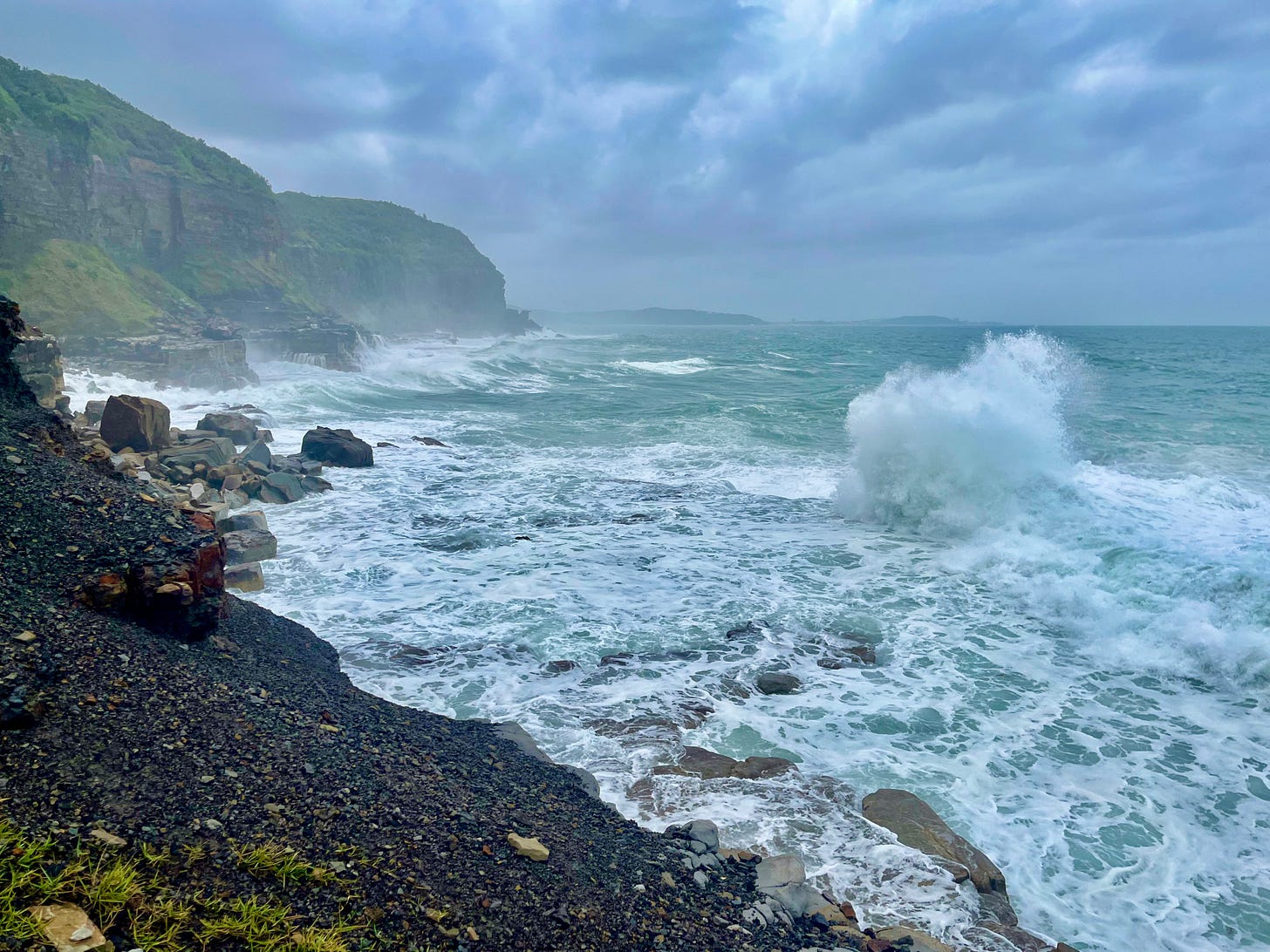

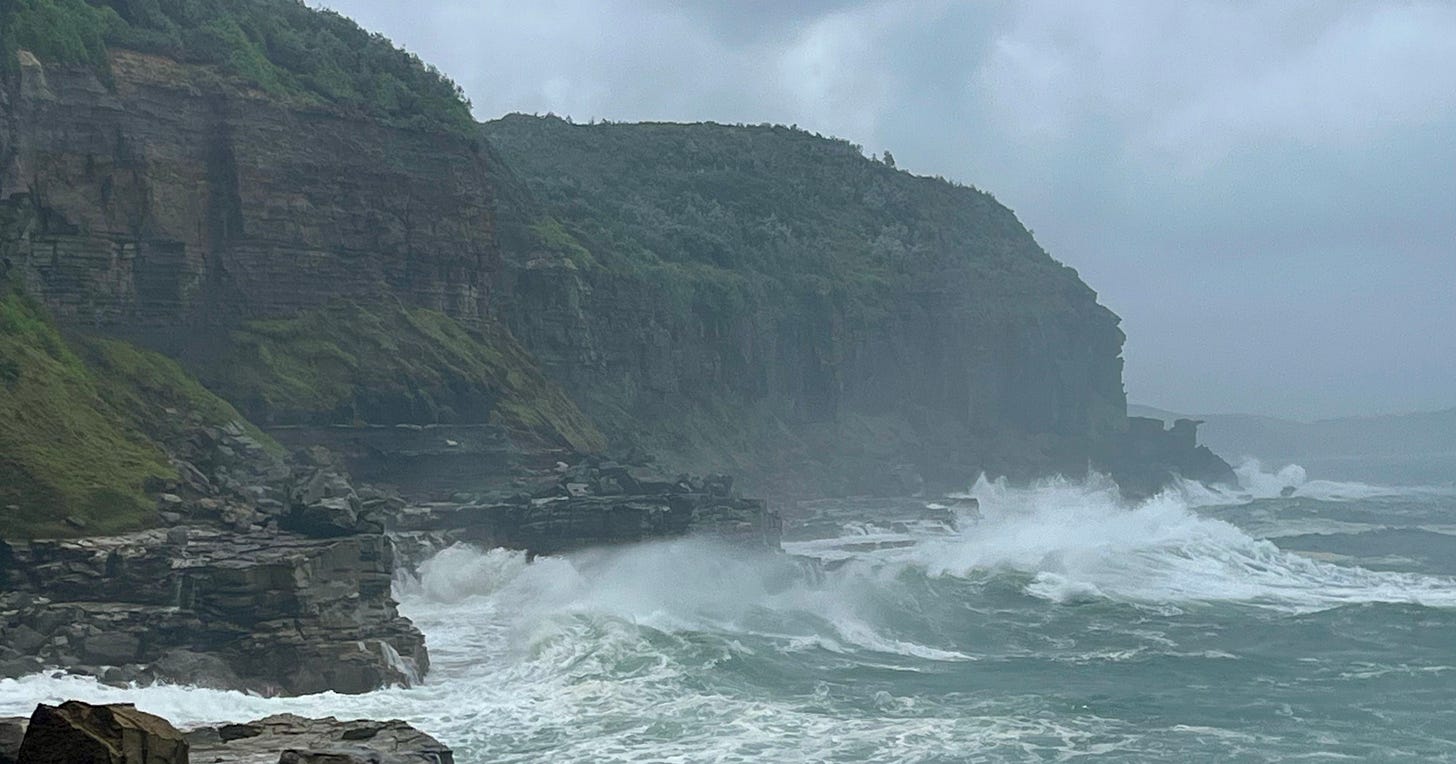


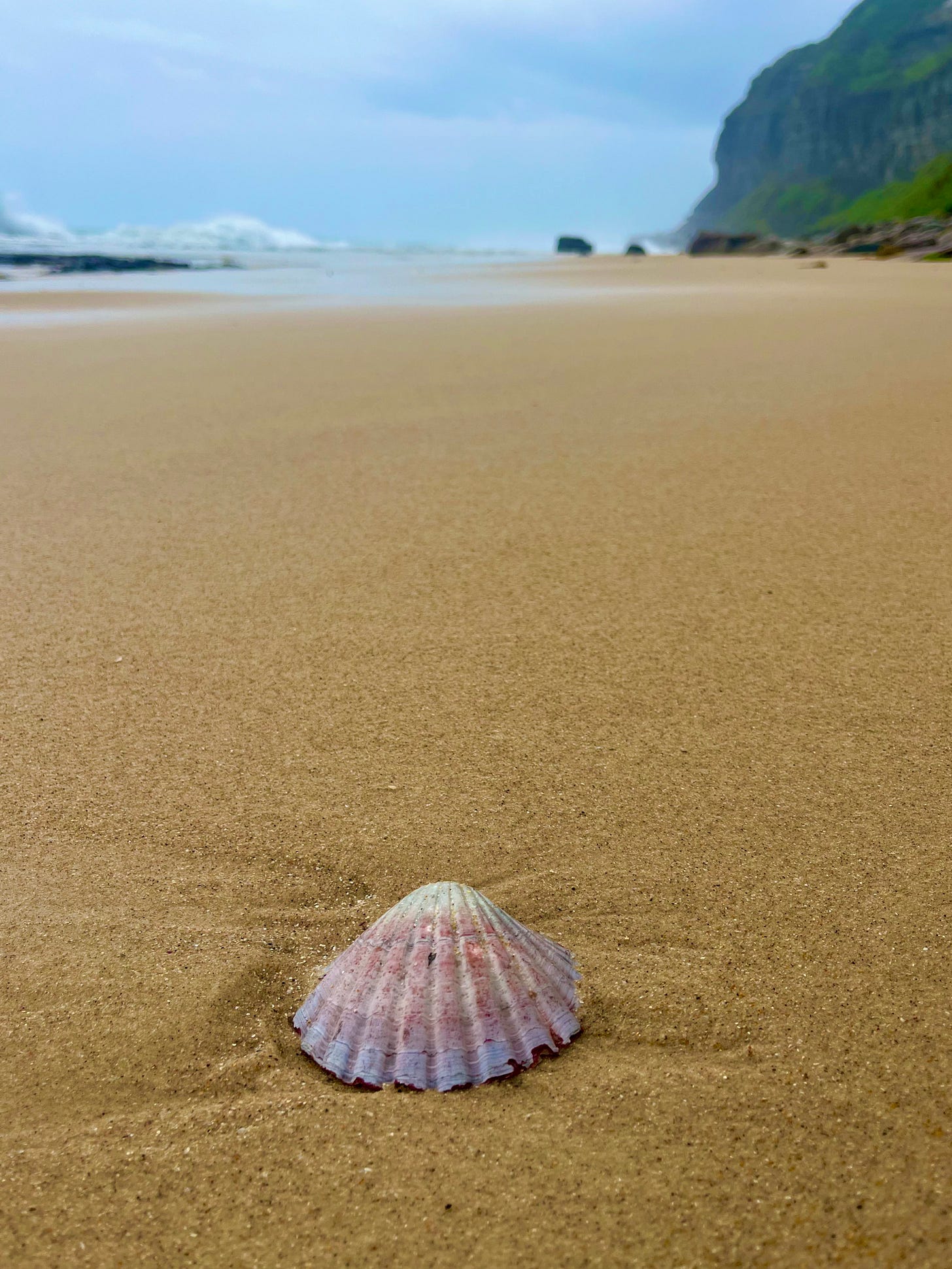
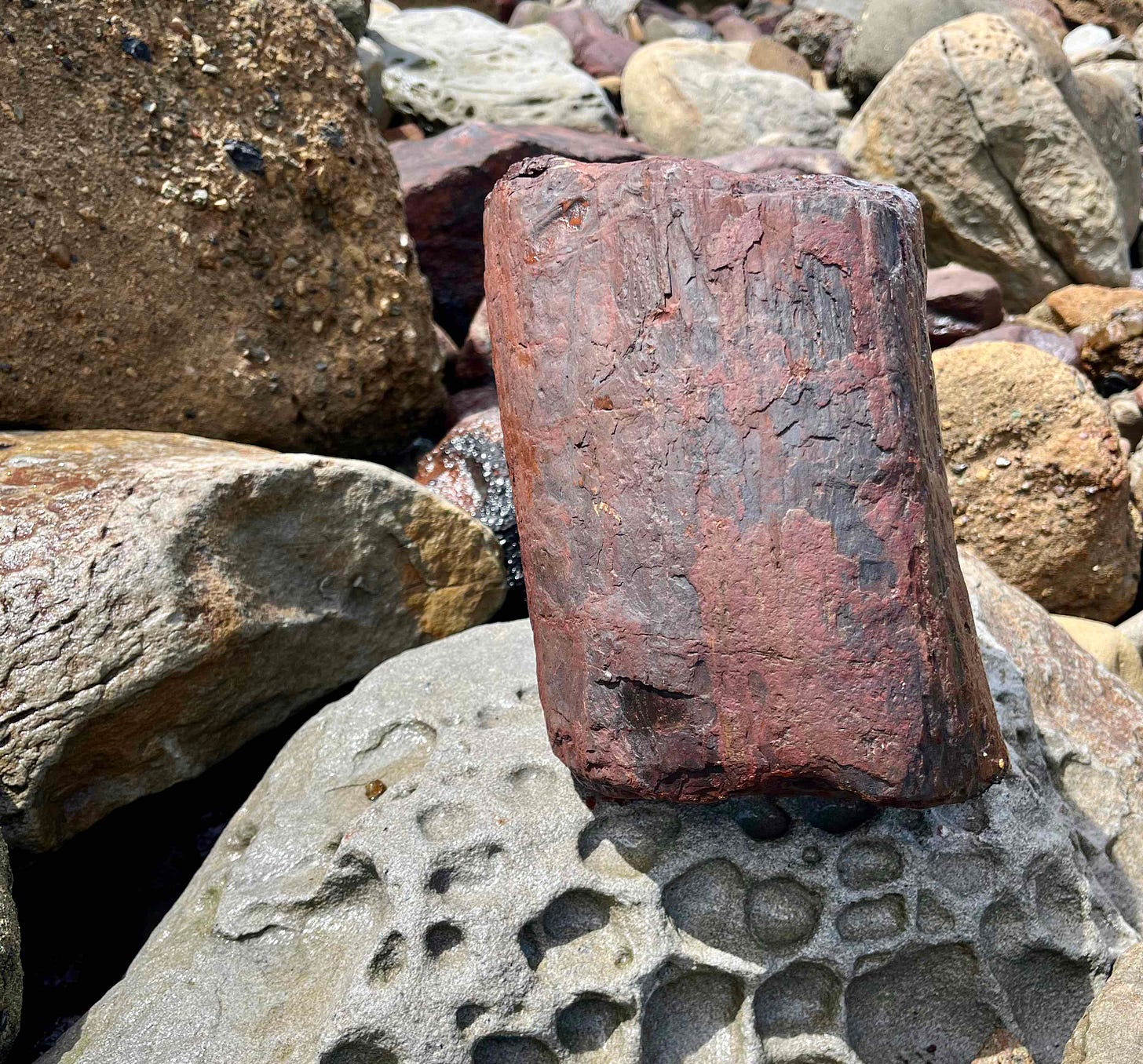

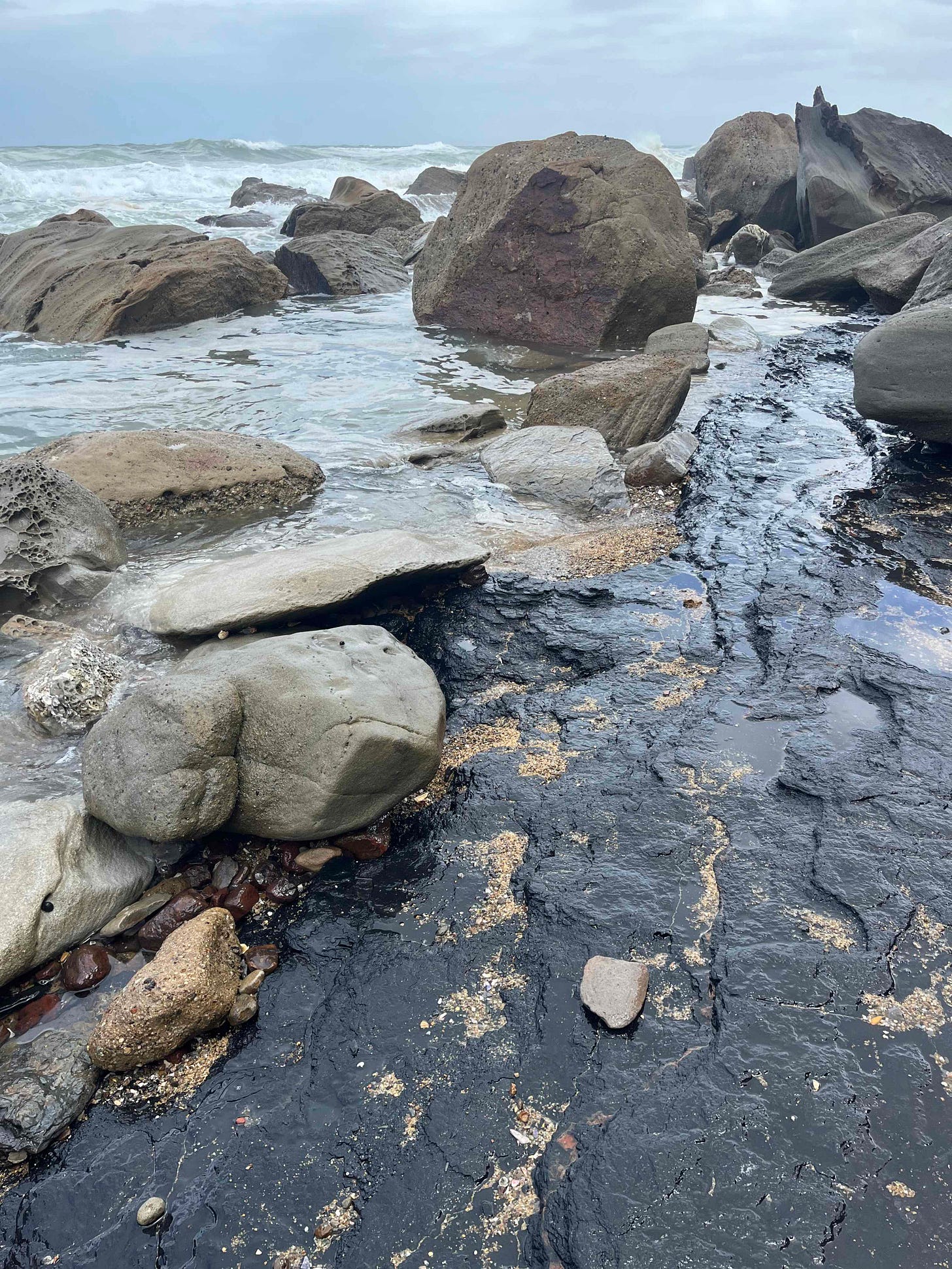
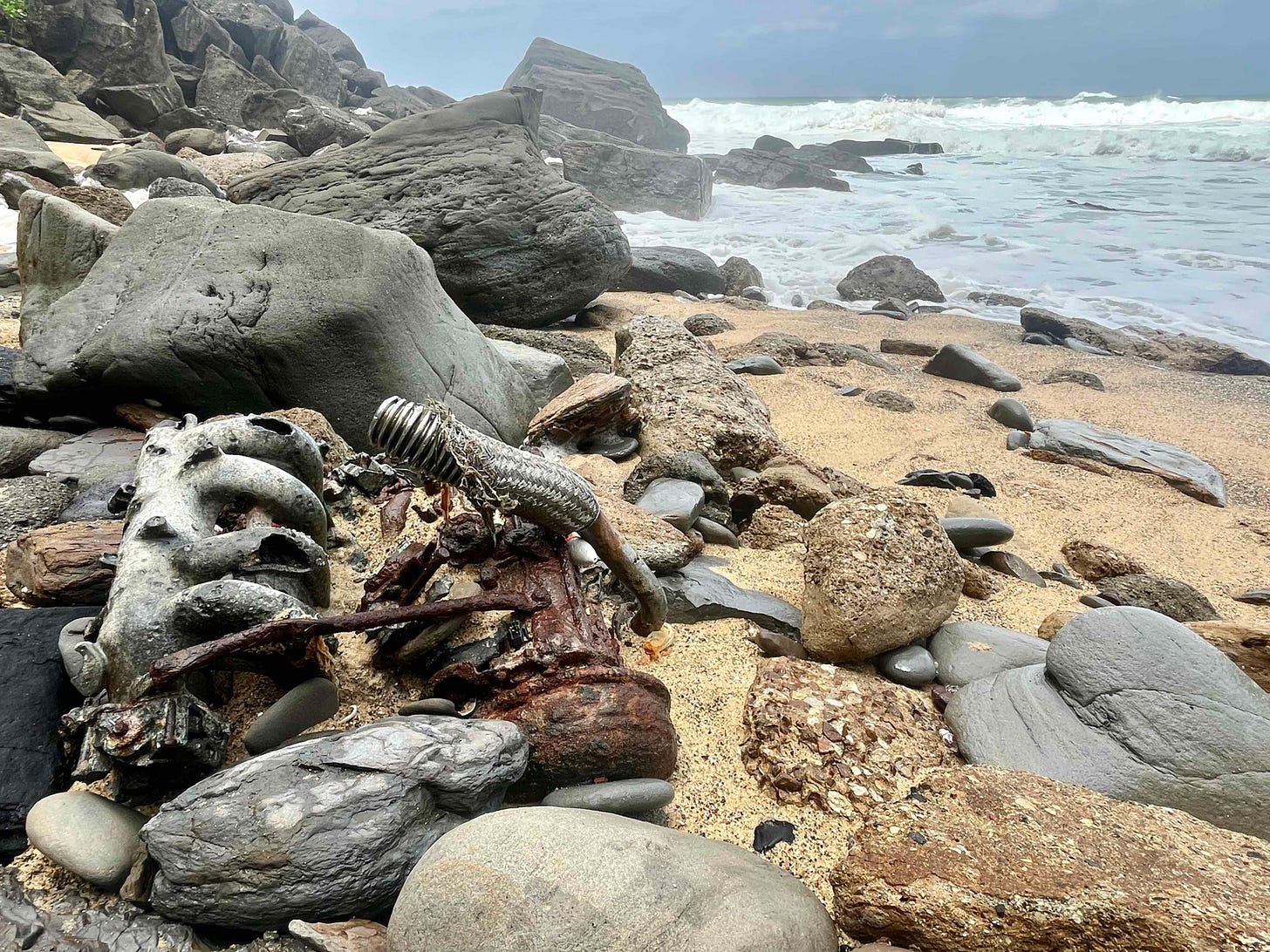
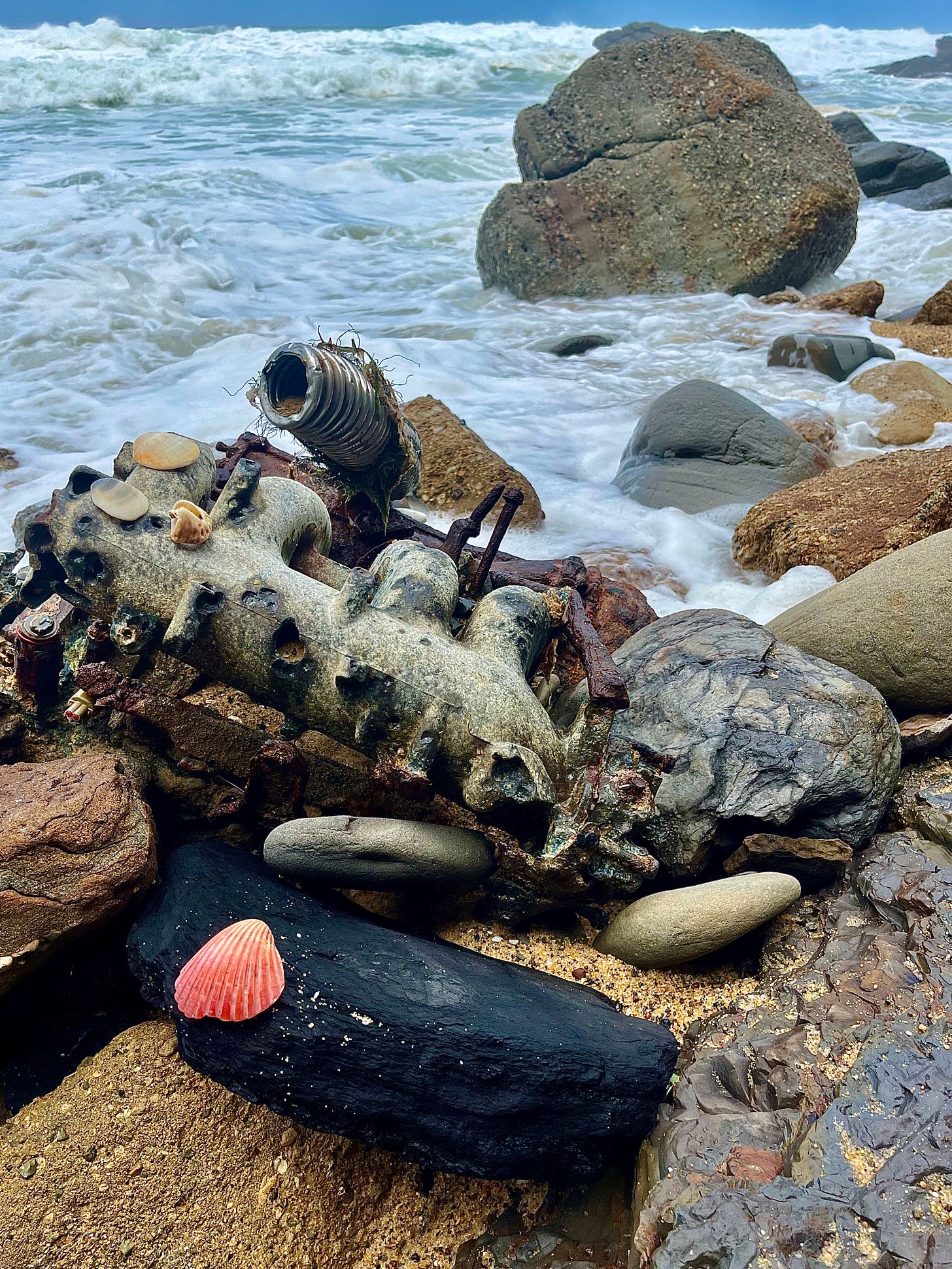

Hi friend Nikos.
Oh!!!
You know - that thought has simply never occurred to me. You have really surprised me.
But I can entirely see why you ask.
The answer is no - but the coincidence is very strange.
“Comet” was written and published when I lived in the desert, in around 1996.
The sea cliffs in “Splash Zone” are near my home town, and they are a place I have visited and knew long before I went to the desert.
However - the poor woman who actually ended her life there - that event was a few years after I returned from the desert.
Some time around 2004 as near as I can recall, when I was back in my home town and struggling with life myself. So - about 8 years after I wrote “Comet.”
The sea cliffs were a place I visited quite often- alone or sometimes with my children. After I found the car wreck, and then learned the truth behind it, she became inextricably tangled with my association with that place.
And yet - I never once thought of “Comet.”
I wrote Splash Zone just a few days ago, but I still didn’t think of Comet.
Yet you did - immediately….
So - no - there was no literal link between the two, other than coincidence.
But now …. Well … you have forged an emotional link in my mind.
This is something I will think about….
Best Wishes - Dave
David, this is glorious. And sad. And hopeful. And awful, in the sense of AWE-FULL. It makes me think of my last poem, how sad.....but even if all else goes, there will be the sea, there will be the sand....is this a comfort? Maybe. I like to think that.....have you seen Battlestar Galactica? There is an episode near the end that says what I'm trying to say. In any case, I envy you all this. I have never lived anywhere near the sea....except for a brief moment when I was too young and poor to visit it. I like your poem, I like your prose even more. You are a wordsmith, either way. Thank you for posting this, thank for sharing yourself with us.